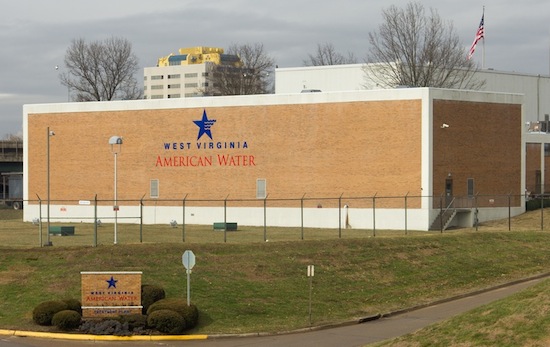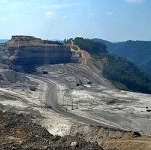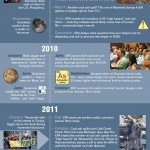Thursday, January 16th, 2014 | Posted by Matt Wasson | 14 Comments

The paper trail of West Virginia Public Service Commission filings document the dramatic expansion of American Water Company's network over the past two decades, and why so many people in this water-rich state depend on a single, privately-owned treatment system and distribution network that sprawls across nine counties for their supply of drinking water. [
Read More ]
Wednesday, January 15th, 2014 | Posted by | No Comments

West Virginia’s state and federal leadership fight tooth-and-nail against new rules and the enforcement of existing laws that protect our air, water and health because the earnings of companies bankrolling their political careers might be affected. Now, facing another crisis, we're rightfully wondering: How many wake-up calls do West Virginia’s elected leaders get? [
Read More ]
Tuesday, January 14th, 2014 | Posted by Thom Kay | 2 Comments

More than 2,000 miles of Appalachian streams have been buried or poisoned by the valley fills associated with mountaintop removal mining. Yet, despite touting his credentials as a former coal regulator, Rep. Kevin Cramer (R-ND) believes that current stream protections are sufficient and dumping mining waste into streams is illegal. [
Read More ]
Thursday, January 9th, 2014 | Posted by Hannah Wiegard | 3 Comments

Virginia Governor-elect Terry McAuliffe claims that “we need to build on the assets we have” by using carbon capture technology. But carbon pollution isn’t the only measure of coal’s impact on Virginia. Continuing to mine and burn coal will still cause serious problems: more destructive mountaintop removal, toxic mining waste, air and water pollution from power plants, all while southwestern Virginia continues to feel the worst effects of deferring a cleaner energy future. [
Read More ]
Wednesday, January 8th, 2014 | Posted by Molly Moore | No Comments

On this day 50 years ago, President Lyndon Johnson sat on a front porch of a weary-looking eastern Kentucky home and declared war on poverty. At the time, one in three Appalachians were considered poor. The poverty rate in the region is now closer to the national average — 16.1 percent in Appalachia compared to 14.3 percent nationally — but, as you might suspect, those statistics tell only part of the story. Economic disparities between Appalachian counties and sub-regions remain high, and, as it was in 1964, eastern Kentucky remains a focal point. [
Read More ]
Tuesday, January 7th, 2014 | Posted by Brian Sewell | No Comments

With the management of the N.C. Department of Environment and Natural Resources' penchant for self-praise, the future must seem pretty bright. But beyond the narrative contrived in media releases, public criticism and displays of distrust in the agency’s direction have become commonplace in North Carolina’s largest newspapers and media outlets. And it’s making North Carolina’s environmental community stronger. [
Read More ]
Tuesday, December 31st, 2013 | Posted by Molly Moore | No Comments

When the battlefield on Blair Mountain was removed from the National Historic Register in 2009, West Virginia resident Doug Estepp was outraged. As the site of a landmark uprising of coal miners in 1921, Estepp reasoned that tourism centered around the state’s compelling history could be a source of sustainable economic diversification and also help raise awareness of the region’s stories and struggles. After Blair Mountain was delisted, Estepp decided that it was time to make that vision a reality.
[
Read More ]
Thursday, December 26th, 2013 | Posted by Brian Sewell | No Comments

A little more than a year ago, Patriot Coal announced it would phase out its use of mountaintop removal coal mining in Appalachia as part of a settlement with environmental groups over selenium pollution. Taken at face value, statements made at that time by Patriot’s CEO Bennett Hatfield held promise that the movement against mountaintop removal, focused on exposing the poor economics as well as the irreversible environmental impacts of the destructive practice, had reached a pivotal turning point.
[
Read More ]
Tuesday, December 24th, 2013 | Posted by Erin Savage | No Comments

For more than 15 years, Appalachian Voices has worked to protect the air, land and water of Central Appalachia. We do this work because the protection of the place we live is integral to the health, happiness and prosperity of our communities. We do this work for the benefit of all people in Central Appalachia.
Despite this, we often feel bogged down in contentious rhetoric that pits “treehuggers” against “friends of coal.” We often must spend all our time dealing with problems -- water pollution, dust problems and violations of existing laws -- when we’d much rather focus on collaboration and finding solutions.
[
Read More ]
Sunday, December 22nd, 2013 | Posted by Amy Adams | No Comments

It has been five years since the TVA Coal Ash disaster in Tennessee, which sent 1.1 billion gallons of toxic coal ash into Emory and Clinch rivers. While the nation has watched and petitioned the U.S. Environmental Protection Agency, the agency responsible for issuing federal standards for coal ash disposal, little action has been taken. Perhaps this is similar to the old adage that says “a watched pot never boils.”
[
Read More ]
Saturday, December 21st, 2013 | Posted by Tom Cormons | No Comments

It was ten months ago when I wrote my first letter to our supporters as the Executive Director of Appalachian Voices. Looking back on the time that has flown by, I take great comfort in knowing that over this short span we made many impressive advances in reducing coal’s impact on our communities and promoting solutions for a cleaner energy future. With the end of 2013 only days away, I want to personally let you know how grateful we are for your commitment to our work this year. Thank you.
Here are just a few highlights of all that we did with your help.
[
Read More ]
Thursday, December 19th, 2013 | Posted by Brian Sewell | 3 Comments

It's been five years since more than a billion gallons of coal ash flooded rivers and neighborhoods surrounding the Tennessee Valley Authority's Kingston Fossil Plant. The U.S. Environmental Protection Agency promised to take action, but to this day Americans are asking the EPA: "Where are you?"
We went back to December 2008 to track political and social progress around the globe, and put it side-by-side with the lack of progress the EPA has made toward protecting clean water and our health from toxic coal ash. Check out the timeline below and click it for a larger version.
[
Read More ]
 The paper trail of West Virginia Public Service Commission filings document the dramatic expansion of American Water Company's network over the past two decades, and why so many people in this water-rich state depend on a single, privately-owned treatment system and distribution network that sprawls across nine counties for their supply of drinking water. [ Read More ]
The paper trail of West Virginia Public Service Commission filings document the dramatic expansion of American Water Company's network over the past two decades, and why so many people in this water-rich state depend on a single, privately-owned treatment system and distribution network that sprawls across nine counties for their supply of drinking water. [ Read More ]













